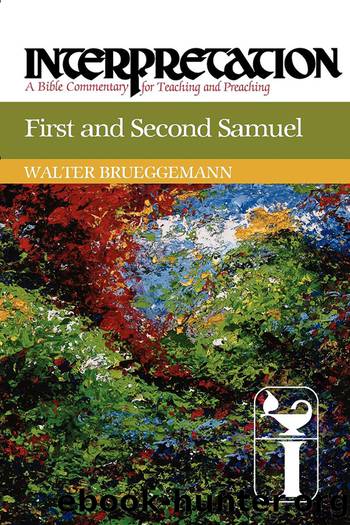First and Second Samuel by Walter Brueggemann

Author:Walter Brueggemann
Language: eng
Format: epub
ISBN: 9781611644494
Publisher: Westminster John Knox Press
I Samuel 26:1â25
Since chapter 16, the narrative has been shaped so that Saul and David are on a collision course. Saul is the entrenched king under threat. David is not a threat to Saul because of his own aggressive initiatives against Saul but because of the inscrutable workings of Yahweh, wrought through the odd turns of the narrative. In hearing this narrative, Israel knows there must be a confrontation between Saul and David. There must be a resolution of the issue of power. Neither the resolution of Saulâs throne nor the celebration of Davidâs promised throne can be narrated without involving the other.
Saul and David, in this dramatic narrative, are locked into an inescapable win-lose situation. The narrator intensifies our eager expectation of that inevitable meeting and then makes us wait for its resolution. We seem to wait an inordinately long time. In its narrative presentation, however, Israel can wait patiently, because Israel has confidence in the outcomeâwhich will surely be Davidic. What interests Israel in the narrative is not simply the outcome but the tortured, artistic way in which the outcome is wrought.
In the end, the confrontation of Saul and David has an odd settlement. For a long stretch of the narrative, Saul is the stalker seeking out David; David is the one stalked, who must always seek escape. Even at the threshold of this climactic episode, Saul and David are in their assigned roles. As this narrative begins, however, their roles are reversed. Abruptly and unexpectedly, Saul is the hunted one and David is the hunter. The reversal of roles is wrought with deftness. David, we know, is sure to succeed; however, we learn that he is unwilling to seize violently his unclaimed, unavoidable success.
In the memory of Israel, the narrative confrontation can have only one outcome: David will win. David must win, both because history is remembered that way and because the narrator has shown us the hidden hovering of Yahweh over the life of David. For the same reasons, Saul must lose, because the memory of Israel knows he was beaten and removed from power and because the narrator offers the irrevocable verdict of Samuel against Saul. The outcome is sure. Its telling, however, is anguished, paced, disciplined, and finally breathtaking in its power.
With its deep joy and pride in David, Israel loved to tell and retell the outcome of David over Saul. That outcome was so sweet for David, so pathos-filled for Saul, that it required the best narrative art Israel could muster. We have already seen this tale told in chapter 24. To record only the tale, chapter 24 is enough. Israel, however, knew this tale was crucial for its future, its faith, and its self-understanding. Israel could not leave the story with such a simple telling. The same narrative is retold in chapter 26.
At a surface reading, the two versions are parallel and in some sense the second is redundant. The story line is the same in the two tellings. David by stealth has sleeping Saul in his power.
Download
This site does not store any files on its server. We only index and link to content provided by other sites. Please contact the content providers to delete copyright contents if any and email us, we'll remove relevant links or contents immediately.
| Adult Ministry | Children's Ministry |
| Counseling & Recovery | Discipleship |
| Evangelism | Missions & Missionary Work |
| Preaching | Sermons |
| Youth Ministry |
The Rape Of Nanking by Iris Chang(2330)
The Secret Power of Speaking God's Word by Joyce Meyer(2257)
Chosen by God by R. C. Sproul(1766)
Crash the Chatterbox by Steven Furtick(1658)
Habits of Grace by David Mathis(1457)
Knowing God by J.I. Packer(1436)
How To Be Born Again by Billy Graham(1407)
A Prophet with Honor by William C. Martin(1376)
Peace with God by Billy Graham(1320)
God's Smuggler by Brother Andrew(1221)
Confronting Christianity by Rebecca McLaughlin(1216)
Whisper by Mark Batterson(1160)
Angel Dreams by Virtue Doreen Virtue Melissa(1147)
Missionaries by Norman Lewis(1139)
The Truth War by John MacArthur(1108)
The School of Biblical Evangelism by Ray Comfort(1101)
The Poems of Rowan Williams by Rowan Williams(1073)
Do Greater Things by Robby Dawkins(1049)
Eucharistic Miracles by Cruz Joan Carroll(1021)
